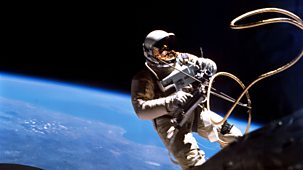
Series 1: 2. A Place Beyond the Sky - Part 2
Under von Braun’s leadership, America’s technology finally seemed to be catching up with the Soviet Union’s. On 5 May 1961, von Braun’s Redstone rocket successfully launched American navy test pilot Alan Shepard 116 vertical miles up into space. The American space programme grew rapidly. \n\nOn 20 February 1962, a marine colonel named John Glenn successfully orbited the Earth. Nasa and Wernher von Braun were at last delivering real results. Sputnik’s challenge and Soviet cosmonaut Yuri Gagarin’s groundbreaking feat had been equalled. But the young president would never live to see man walk on the moon. On 22 November 1963 in Dallas, Texas, Kennedy was assassinated and Cape Canaveral, home to US space exploration, was quickly renamed Cape Kennedy, in honour of the fallen visionary.\n\nA film By Robert Stone.\n\nA Robert Stone Production for American Experience WGBH/PBS in association with Arte France.
Source: BBC 4
Most recent episodes of Chasing the Moon
Chasing The Moon
Series 1: 6. Magnificent Desolation - Part 2
Viewers from around the world watched the flickering black-and-white footage from a camera placed on the module showing Armstrong gingerly stepping down its ladder. ‘OK, I ...
07-05-2024
BBC 4
Chasing The Moon
Series 1: 5. Magnificent Desolation - Part 1
After the immediate celebration of 1968’s successful Apollo 8 mission, underlying questions about the space programme emerged with new intensity as politicised young Ameri ...
07-05-2024
BBC 4
Chasing The Moon
Series 1: 4. Earthrise - Part 2
In the aftermath of the deadly Apollo 1 fire, Nasa faced harsh scrutiny. The horror of the first casualties at Cape Kennedy led Americans to increasingly question the very premi ...
30-04-2024
BBC 4
Chasing The Moon
Series 1: 3. Earthrise - Part 1
What exactly was it going to take for America to beat the Soviets to the moon? Cold War tensions persisted, as rumours circulated that the Soviets were preparing to send an unma ...
30-04-2024
BBC 4
Chasing The Moon
Series 1: 2. A Place Beyond The Sky - Part 2
Under von Braun’s leadership, America’s technology finally seemed to be catching up with the Soviet Union’s. On 5 May 1961, von Braun’s Redstone rocket s ...
23-04-2024
BBC 4
Chasing The Moon
Series 1: 1. A Place Beyond The Sky - Part 1
On 4 October 1957, Soviet scientists launched Sputnik 1 - a beach ball-sized, radio-transmitting aluminium alloy sphere - into orbit. The satellite caused a sensation. Amid Cold ...
23-04-2024
BBC 4
Most popular episodes of Chasing the Moon
Chasing The Moon
Series 1: 1. A Place Beyond The Sky - Part 1
On 4 October 1957, Soviet scientists launched Sputnik 1 - a beach ball-sized, radio-transmitting aluminium alloy sphere - into orbit. The satellite caused a sensation. Amid Cold ...
23-04-2024
BBC 4
Chasing The Moon
Series 1: 2. A Place Beyond The Sky - Part 2
Under von Braun’s leadership, America’s technology finally seemed to be catching up with the Soviet Union’s. On 5 May 1961, von Braun’s Redstone rocket s ...
23-04-2024
BBC 4
Chasing The Moon
Series 1: 5. Magnificent Desolation - Part 1
After the immediate celebration of 1968’s successful Apollo 8 mission, underlying questions about the space programme emerged with new intensity as politicised young Ameri ...
07-05-2024
BBC 4
Chasing The Moon
Series 1: 6. Magnificent Desolation - Part 2
Viewers from around the world watched the flickering black-and-white footage from a camera placed on the module showing Armstrong gingerly stepping down its ladder. ‘OK, I ...
07-05-2024
BBC 4
Chasing The Moon
Series 1: 3. Earthrise - Part 1
What exactly was it going to take for America to beat the Soviets to the moon? Cold War tensions persisted, as rumours circulated that the Soviets were preparing to send an unma ...
30-04-2024
BBC 4
Chasing The Moon
Series 1: 4. Earthrise - Part 2
In the aftermath of the deadly Apollo 1 fire, Nasa faced harsh scrutiny. The horror of the first casualties at Cape Kennedy led Americans to increasingly question the very premi ...
30-04-2024
BBC 4


